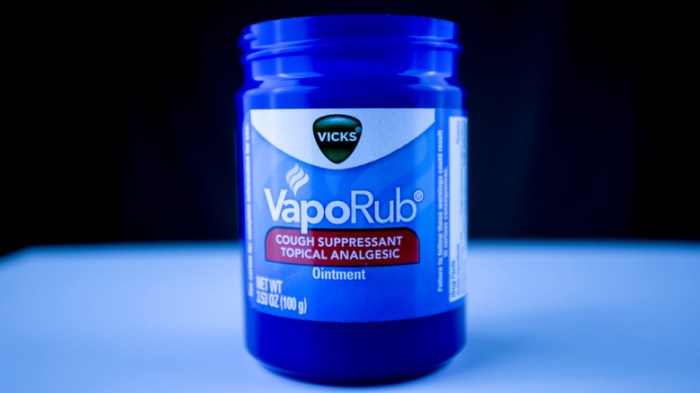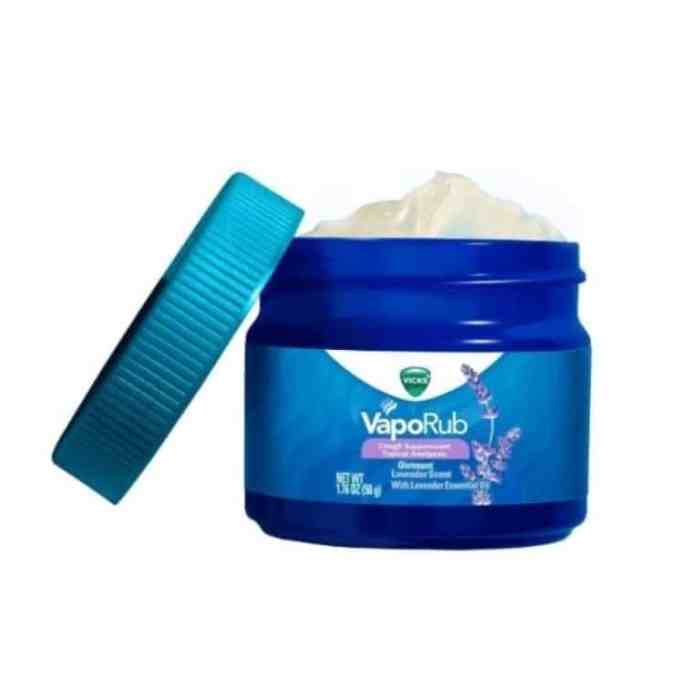Vicks VapoRub, a household staple known for its decongestant properties, has surprisingly found its way into discussions about tooth decay. This article delves into the anecdotal evidence and scientific research surrounding the use of Vicks VapoRub for tooth decay, exploring its potential benefits and risks.
While tooth decay is a serious issue that requires proper dental care, some individuals have reported using Vicks VapoRub as a temporary home remedy to alleviate tooth pain and discomfort.
Vicks VapoRub for Tooth Decay

Vicks VapoRub is a topical ointment commonly used to relieve symptoms of congestion and cough. Its active ingredients include menthol, camphor, and eucalyptus oil, which possess antiseptic and analgesic properties.
Tooth decay, also known as dental caries, is a common dental problem caused by the breakdown of tooth enamel due to the action of bacteria. These bacteria produce acids that dissolve the minerals in the enamel, leading to cavities and tooth pain.
Anecdotal Evidence and Traditional Uses
Vicks VapoRub has been traditionally used as a home remedy for tooth decay. Anecdotal evidence suggests that its active ingredients may have antibacterial and pain-relieving effects on the affected area.
Scientific Evidence and Efficacy
The effectiveness of Vicks VapoRub for tooth decay is a topic of debate, with limited scientific evidence available. Let’s delve into the available studies and their findings.
Studies on Vicks VapoRub for Tooth Decay
- A study published in the Journal of the American Dental Association in 2006 found that Vicks VapoRub had no significant effect on the growth of Streptococcus mutans, a bacterium associated with tooth decay.
- Another study published in the Journal of Clinical and Experimental Dentistry in 2015 reported that Vicks VapoRub showed some antibacterial activity against Streptococcus mutans but did not significantly reduce tooth decay in rats.
Conclusions and Limitations, Vicks vaporub for tooth decay
The current scientific evidence suggests that Vicks VapoRub may have some antibacterial properties, but its effectiveness in preventing or treating tooth decay remains inconclusive. More research is needed to fully evaluate its potential benefits and limitations.
Potential Benefits and Risks

While there is limited scientific evidence supporting the use of Vicks VapoRub for tooth decay, anecdotal accounts suggest potential benefits. The camphor and menthol in Vicks VapoRub may act as mild antiseptics, reducing bacteria in the mouth and alleviating tooth pain temporarily.
Vicks Vaporub, while not a recommended treatment for tooth decay, is a topic that has been gaining traction online. For a spiritual perspective, we can turn to the Apostles’ Creed in Spanish, the apostles creed in spanish , which offers guidance and comfort.
Returning to the subject of tooth decay, it’s important to consult a dentist for proper diagnosis and treatment.
Additionally, the cooling sensation may provide some relief from discomfort.
Potential Risks and Side Effects
However, it is crucial to be aware of the potential risks associated with using Vicks VapoRub on teeth. Vicks VapoRub contains ingredients that may be harmful if ingested or applied to the gums or mucous membranes. These ingredients include:
- Camphor: Can cause nausea, vomiting, seizures, and even death in high doses.
- Menthol: Can cause irritation, burning, and allergic reactions in some individuals.
- Eucalyptus oil: Can cause skin irritation and respiratory problems.
Additionally, the petroleum jelly base of Vicks VapoRub can trap bacteria and debris on the teeth, potentially contributing to tooth decay.
Importance of Consulting a Healthcare Professional
It is essential to consult with a healthcare professional, such as a dentist, before using Vicks VapoRub for dental issues. They can assess the underlying cause of your tooth decay and recommend appropriate treatment options. Self-treating tooth decay with Vicks VapoRub can delay proper diagnosis and treatment, leading to more severe complications.
Alternative Remedies and Treatments
Vicks VapoRub is not a scientifically proven treatment for tooth decay. However, some people believe that it may provide temporary relief from pain and discomfort.
There are several other home remedies that people use for tooth decay, including:
- Salt water rinses
- Hydrogen peroxide rinses
- Baking soda paste
- Clove oil
- Tea tree oil
While these remedies may provide temporary relief, it’s important to note that they are not a substitute for professional dental care.
Effective and Scientifically Supported Treatments for Tooth Decay
The most effective and scientifically supported treatments for tooth decay include:
- Fluoride treatments
- Dental sealants
- Fillings
- Crowns
- Root canals
These treatments can help to prevent, repair, and restore damaged teeth.
Importance of Seeking Professional Dental Care for Tooth Decay
If you are experiencing tooth decay, it is important to see a dentist as soon as possible. Early diagnosis and treatment can help to prevent further damage to your teeth and gums.
Your dentist can provide you with the best treatment options for your specific needs and can help you to maintain good oral hygiene.
Commonly Asked Questions: Vicks Vaporub For Tooth Decay
Can Vicks VapoRub cure tooth decay?
No, Vicks VapoRub cannot cure tooth decay. It may provide temporary pain relief, but it does not address the underlying cause of the decay.
Is it safe to use Vicks VapoRub on teeth?
Using Vicks VapoRub on teeth is generally considered safe for short-term use. However, it is important to avoid swallowing it and to rinse your mouth thoroughly after use.
Should I use Vicks VapoRub instead of going to the dentist?
No, Vicks VapoRub should not be used as a substitute for professional dental care. If you have tooth pain or decay, it is important to see a dentist as soon as possible.